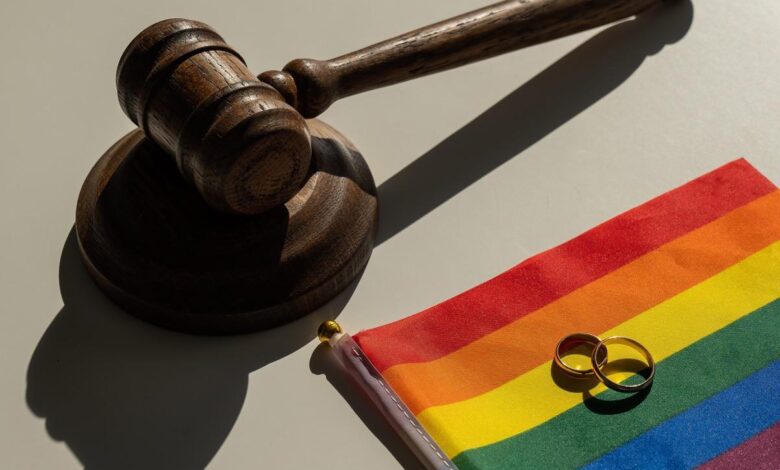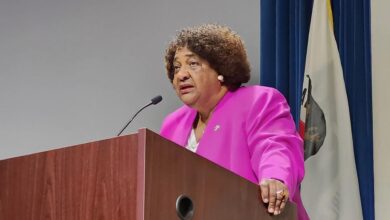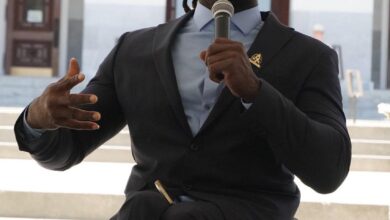
Edward Henderson | California Black Media
Natasha Hooper, a poet and event host in San Diego, said she is commemorating LGBTQ+ Pride Month by honoring Black historical figures – often overlooked or underappreciated by the broader LGBTQ+ community — and celebrating in solidarity with other African Americans.
Hooper emphasized the need to strengthen community bonds, especially as LGBTQ+ people face growing hate and shrinking rights.
Hooper said she and her friends plan to attend Pride events that celebrate Black people including picnics, pool parties, music events and networking opportunities.
“I grew up very much closeted and it took me a while to kind of come into my own with my queerness, Hooper told California Black Media. (CBM).
“However, as an adult, I think it’s an important time to acknowledge our Black history in the LGBTQ+ community and the people who have fought and sacrificed for the freedoms we have now. Some of those people having fought for Civil Rights at the same time; Bayard Rustin, Marsha P. Johnson, James Baldwin and others. I think it would’ve also made life for my younger self a lot less lonely knowing I could be living the life I am now.” Hooper added.
According to the most recent survey conducted by the California Civil Rights Department (CRD) in partnership with the UCLA Center for Health Policy Research, Lesbian, gay, bisexual, and pansexual (12%) and transgender (19%) adult respondents were more likely to experience hate than Californians overall.
Researchers surveyed more than 20,000 households on health and hate related questions for the report.
One year after Gov. Gavin Newsom officially proclaimed June as LGBTQ+ Pride month, the current political and social climate in the country has raised questions on how celebrations like Pride will be regarded by the mainstream in the future.
“This month, we celebrate the resilience of the LGBTQ+ community and their hard-fought victories to advance acceptance and equality,” said Newsom in a release after proclaiming June Pride month. “We must also rededicate ourselves to the continued fight — standing together, united, to protect and build on our progress toward a better, more inclusive, and safer future for all.”
This year, some corporations that previously aligned themselves with LGBTQ+ celebrations and campaigns have begun to decrease or drop their support as they align with the Trump administration’s anti-diversity posture.
Gravity Research, a risk management advisory firm, reports that 39% of corporations say they plan to scale back public Pride Month engagements this year, according to a survey of more than 200 executives. That includes sponsoring Pride events, posting supportive messages of LGBTQ+ rights on social media and selling Pride-themed merchandise.
“It’s clear that the administration and their supporters are driving the change,” said Luke Hartig, the president of Gravity Research. “Companies are under increasing pressure not to engage and speak out on issues.”
Sixty-five percent of companies in Gravity Research’s survey said they were preparing strategies to respond to blowback. A growing number of chains, including Walmart, Target, Kroger, have also been warning investors about the risks of consumer boycotts over corporate positions on social issues.
Despite the blowback, Black members of the LGBTQ+ community in California are planning to stand strong and ensure that their voices are heard and history is honored.
According to a report from eScholorship, there are an estimated 55,000 Black LGBTQ adult members in California. This group represents 3.2% of the state’s Black adult population, which is higher than the national average. Additionally, there are roughly 7,400 Black men and women in same-sex relationships in California. Since many individuals do not share this information with data collectors, the number could be significantly higher.
Part of the history that Hooper acknowledges includes the 1969 Stonewall riots in New York, which are credited with starting the LGBTQ+ movement in the United States that sparked Pride month celebrations nationwide.
Further highlighting the importance of this history is what Hooper sees as the co-opting of Pride month by some White LGBTQ+ people.
“You see a lot of gay cis White men kind of embodying Black women, and their mannerisms — how they speak and different things,” said Hooper.
“It’s interesting because obviously they care about pride and all of the community, but we are still a subset of LGBTQ people,” she added. We are still sort of the minority of the LGBTQ+ community. There a lot of other ethnicities co-opting and borrowing Black culture and experiences. At the same time, they are centering Whiteness, which can be very frustrating.”
Los Angeles Black Pride, taking place over July 4th weekend, is the premiere event in California with multiple parties and gatherings geared toward Black LGBTQ+ people. San Diego also hosts a prominent Black Pride Festival. Another well-attended event in the northern part of the state is Soul of Pride in San Francisco.




